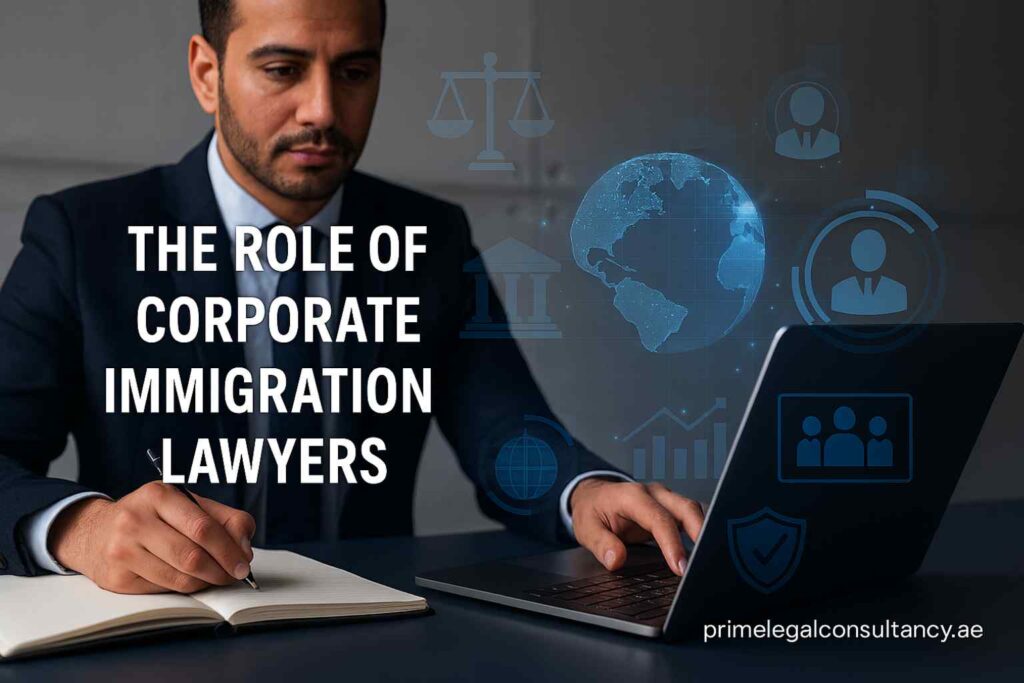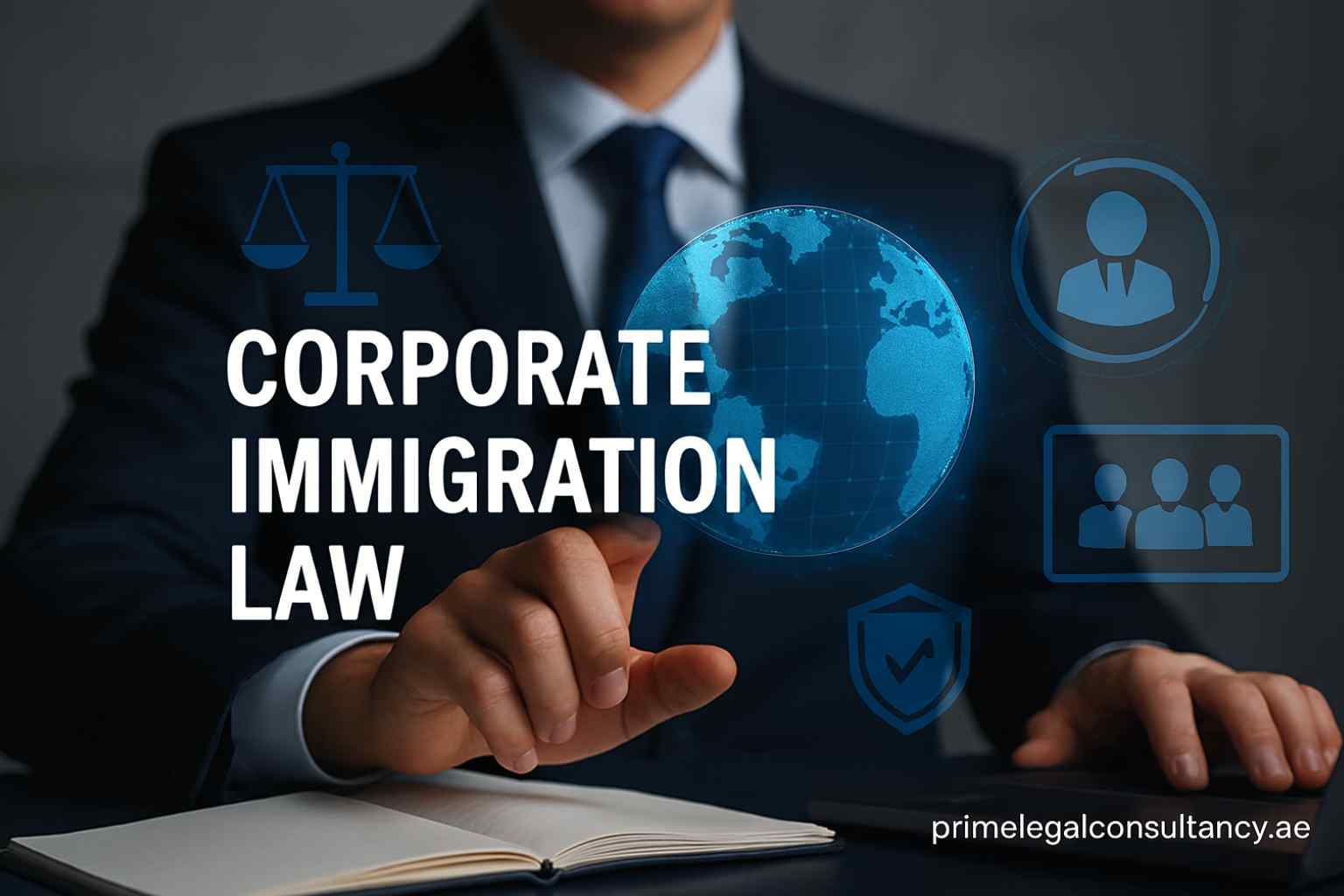Table of Contents
ToggleIntroduction
Global business expansion has become a defining factor for companies aiming to compete on an international stage. Corporate immigration law plays a pivotal role in enabling organizations to bring in the right talent, comply with government regulations, and streamline cross-border workforce mobility. For businesses planning to scale into new markets, understanding immigration regulations is no longer optional — it is an absolute necessity.
The ability to hire and relocate foreign employees directly impacts growth, diversity, and operational efficiency. Companies that overlook immigration law often face compliance issues, delays, and financial penalties. This guide aims to simplify complex aspects of corporate immigration law, offering practical insights for businesses and highlighting why expert legal support from firms like primelegalconsultancy.ae can be the difference between smooth expansion and costly errors.

What is Corporate Immigration Law?
Corporate immigration law refers to the legal framework governing the movement of employees across borders for work purposes. It encompasses everything from obtaining work permits to ensuring businesses comply with sponsorship obligations. While individual immigration focuses on personal relocations or family visas, corporate immigration addresses the structured hiring and transfer of skilled professionals for organizational needs.
Employers, HR managers, and corporate legal teams are the primary stakeholders in this process. Their role is to make sure every hire from abroad has the proper legal documentation while ensuring the company adheres to local labor and immigration policies. This makes corporate immigration law an integral part of global workforce management.
Why Corporate Immigration Law is Important for Businesses
Access to international talent is one of the strongest drivers for business success. Corporate immigration law allows organizations to recruit the best minds from around the globe without being limited by geographical barriers. A well-managed immigration process gives companies a competitive edge in industries where highly skilled professionals are in demand.
Compliance is another critical aspect. Companies failing to follow immigration rules face hefty penalties, legal disputes, and reputational damage. Beyond compliance, corporate immigration law also fosters workforce diversity and supports mobility by ensuring employees can relocate seamlessly. Businesses that invest in proper immigration practices enhance their reputation as responsible employers and attract top-tier candidates worldwide.
Latest Trends and Updates in Corporate Immigration Law (2025)
Rapid changes in the global workforce have led to significant updates in corporate immigration law. Governments worldwide are tightening compliance measures, introducing stricter penalties for violations, and requiring businesses to maintain transparent processes. Companies must now document every step of visa sponsorship and employee transfers to avoid legal risks.
Another important trend is the digital transformation of immigration systems. E-visas, online compliance portals, and automated documentation have made the process faster but also more transparent. Post-pandemic remote work policies continue to influence immigration, with many countries adapting laws to accommodate hybrid and remote employment structures. These changes make it essential for businesses to stay informed about current regulations.

Key Areas Covered Under Corporate Immigration Law
Work permits and employment visas form the backbone of corporate immigration law. Companies must navigate detailed application processes, proving the necessity of foreign hires and ensuring positions comply with labor market tests. Residency requirements also play a key role, often linked to long-term assignments and family sponsorships.
Corporate immigration law also covers business travel, short-term assignments, and the obligations companies have as sponsors. Immigration audits are becoming more common, where authorities review a company’s records to ensure compliance. Organizations that prepare in advance avoid disruptions and maintain credibility with regulatory authorities.
Corporate Immigration Challenges Businesses Face
Visa approval delays are a significant challenge. Inconsistent processing times across different jurisdictions can affect hiring schedules and disrupt project deadlines. For businesses dependent on skilled foreign workers, such delays can translate into lost opportunities and increased costs.
Legal complexities across different countries add another layer of difficulty. Each jurisdiction has unique requirements, and failure to understand these nuances can result in non-compliance. Balancing local hiring quotas with the need for global talent makes corporate immigration an even more delicate matter for businesses to manage.
Best Practices for Companies Navigating Immigration Law
Successful companies often rely on experienced immigration consultants or dedicated lawyers to streamline their processes. Expert guidance helps avoid errors in documentation and ensures compliance with evolving legal frameworks. Partnering with professionals such as primelegalconsultancy.ae ensures businesses stay on track while reducing risks.
Another best practice is to invest in in-house compliance teams. Equipping HR departments with training and tools to monitor visa status, track renewals, and maintain employee records ensures smoother operations. Technology solutions such as visa tracking software provide additional support by automating reminders and reducing administrative burden.
Corporate Immigration Law by Region (2025 Focus)
Corporate immigration rules vary significantly by region. Below is a quick overview of key frameworks shaping workforce mobility:
| Region | Highlights of Corporate Immigration Law (2025) |
|---|---|
| United States | Strict regulations on H-1B and L-1 visas, increased compliance audits, and rising scrutiny on employers sponsoring foreign talent. |
| United Arab Emirates | Business-friendly policies supporting expatriate workers, simplified visa categories, and long-term residency options for investors and skilled professionals. |
| European Union | Post-Brexit immigration reforms requiring additional permits for UK workers, harmonization of blue-card systems to attract high-skilled talent. |
| Asia-Pacific | Emerging hubs such as Singapore and Australia streamlining work permits to attract global professionals, focus on technology-driven visa applications. |

The Role of Corporate Immigration Lawyers
Businesses often underestimate the complexity of immigration laws until they face compliance issues. Corporate immigration lawyers act as strategic partners, helping companies prepare documentation, manage visa applications, and design immigration strategies aligned with business goals. Their role extends beyond paperwork to providing proactive compliance support and minimizing risks.
The cost of hiring immigration lawyers may seem high initially, but the long-term benefits outweigh the expense. Avoiding fines, ensuring timely visa approvals, and reducing administrative overhead contribute to significant savings. For many organizations, partnering with legal experts ensures peace of mind and a smoother path to global expansion.
Future of Corporate Immigration Law
Artificial intelligence and automation are set to transform immigration processes in the coming years. Automated documentation, AI-driven compliance monitoring, and cross-border mobility platforms will become standard tools for businesses. This will make processes faster but also require companies to adapt to new technologies.
Corporate immigration law will also integrate with broader ESG requirements, where businesses are expected to demonstrate ethical hiring and compliance with social governance standards. Predictions suggest that workforce mobility will expand, but companies must prepare for stricter oversight. The next five years will bring both opportunities and responsibilities for businesses operating across borders.
Also Read: Business Immigration Law 2025 – Expert Guide for Entrepreneurs
Conclusion
Corporate immigration law has become one of the most critical pillars of global business operations in 2025. Companies that stay updated with regulations enjoy seamless hiring, stronger compliance, and smoother employee relocations. A proactive approach ensures not only compliance but also enhances competitiveness in an increasingly globalized economy.
Organizations seeking to expand their teams and establish international operations benefit immensely from professional guidance. Partnering with specialized firms such as primelegalconsultancy.ae guarantees accurate advice, timely visa processing, and reliable compliance strategies. Businesses ready to embrace global talent must prioritize immigration law to secure long-term success and growth.
FAQ About Corporate Immigration Law
Q1: What is corporate immigration?
Corporate immigration refers to the process companies follow to legally bring skilled employees from other countries to work in the UAE. It includes obtaining visas, permits, and ensuring compliance with government regulations for smooth hiring and workforce mobility.
Q2: What is the new visa rule in UAE 2025?
Ans: The new UAE visa rule in 2025 introduces simplified procedures, longer validity for some categories, and more flexible options for investors, professionals, and families. These updates aim to attract global talent, support economic growth, and enhance long-term residency opportunities.
Q3: What are the new rules for employment visa in the UAE?
Ans: The updated employment visa rules in the UAE focus on faster processing, enhanced documentation requirements, and improved flexibility for job categories. Employers must meet compliance standards, and employees benefit from clear pathways for renewal, transfers, and long-term residency opportunities.
Q4: What is the immigration card of a company in UAE?
Ans: An immigration card in the UAE is a mandatory document for companies, allowing them to hire foreign employees legally. It is issued by the Ministry of Human Resources and Emiratisation and ensures businesses comply with labour and immigration regulations.
Q5: What are the new rules for UAE immigration?
Ans: The new UAE immigration rules highlight streamlined visa services, longer stay options, and simplified procedures for families and investors. These changes aim to attract skilled talent, promote business growth, and provide greater flexibility for residents, expatriates, and employers.
Q6: What is Article 37 of the UAE Labour law?
Ans: Article 37 of the UAE Labour Law states that probationary periods should not exceed six months. During this time, either party may terminate the contract with notice. It ensures fairness, clarity, and compliance between employers and employees in work agreements.
Q7: What is the 3000 dirham rule?
Ans: The 3000 dirham rule in the UAE refers to the minimum salary requirement for sponsoring family members. Employees earning at least AED 3,000 with accommodation provided, or AED 4,000 without, can sponsor dependents legally under immigration guidelines.
Q8: Can you be deported for overstaying your visa in the UAE?
Ans: Yes, overstaying a visa in the UAE can result in fines, penalties, and possible deportation. Authorities strictly enforce immigration laws, so it’s important to renew or extend your visa on time to avoid legal issues and ensure compliance.
